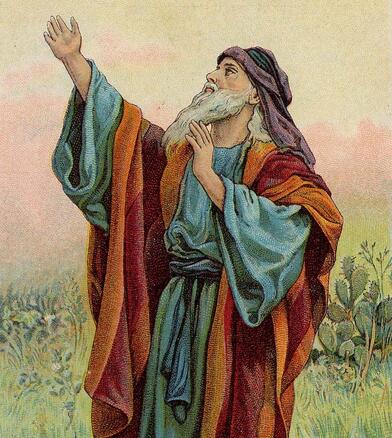John 12:37-50
Lesson 197
Lesson 197
Read both the "King James Bible" and the "New Living Translation."
In this lesson:
Jesus' last public appearance before being nailed to the cross.
He spends His final days with His disciples.
Unbelievers (12:37-41).
Also;
Confession of faith, a seven verse summary of Jesus' entire message (12:44-50).
Jesus' last public appearance before being nailed to the cross.
He spends His final days with His disciples.
Unbelievers (12:37-41).
Also;
Confession of faith, a seven verse summary of Jesus' entire message (12:44-50).
The Prophet Isaiah (Esaias).
(From a Bible card published by the Providence Lithograph Company circa 1904.)
(From a Bible card published by the Providence Lithograph Company circa 1904.)
Who was -
Esaias -
The Greek name for Isaiah. Isaiah (meaning Jehovah is salvation) was an Old Testament prophet who died in 681 BC. Considered by many as the greatest Jewish prophet, Isaiah wrote "The Book of the Prophet Isaiah," which spoke out against hypocrisy (Isaiah 29:13) and idol worship ((Isaiah 2:6-9). In response to Isaiah's warnings, people prayed and made insincere religious sacrifices (Isaiah 1:10-17; 29:13) but refused to actually repent. Isaiah warned that God would punish Jews for their disobedience (Isaiah 3:1-26). Sure enough, Babylon destroyed Israel and carried its citizens away as slaves. Isaiah also prophesized that King Cyrus of Persia would allow the abducted Jewish people to return to Jerusalem 80 years before they were taken captive and over 100 years before Cyrus was even born. He also predicted that Cyrus would allow the rebuilding of the Temple before it had been destroyed. He prophesied the fall of Babylon 100 years before it rose and the coming of the Messiah (Isaiah 7:14) 700 years before Christ's birth. The Bible does not tell us how or when Isaiah died. However, Jewish history reports that King Manasseh of Judah condemned Isaiah to death. Allegedly, he was found hiding in a hollow cedar tree and sawed in half with the tree. Perhaps Hebrews 11:37 is referring to Isaiah. Isaiah is quoted over fifty times in the New Testament.
Esaias -
The Greek name for Isaiah. Isaiah (meaning Jehovah is salvation) was an Old Testament prophet who died in 681 BC. Considered by many as the greatest Jewish prophet, Isaiah wrote "The Book of the Prophet Isaiah," which spoke out against hypocrisy (Isaiah 29:13) and idol worship ((Isaiah 2:6-9). In response to Isaiah's warnings, people prayed and made insincere religious sacrifices (Isaiah 1:10-17; 29:13) but refused to actually repent. Isaiah warned that God would punish Jews for their disobedience (Isaiah 3:1-26). Sure enough, Babylon destroyed Israel and carried its citizens away as slaves. Isaiah also prophesized that King Cyrus of Persia would allow the abducted Jewish people to return to Jerusalem 80 years before they were taken captive and over 100 years before Cyrus was even born. He also predicted that Cyrus would allow the rebuilding of the Temple before it had been destroyed. He prophesied the fall of Babylon 100 years before it rose and the coming of the Messiah (Isaiah 7:14) 700 years before Christ's birth. The Bible does not tell us how or when Isaiah died. However, Jewish history reports that King Manasseh of Judah condemned Isaiah to death. Allegedly, he was found hiding in a hollow cedar tree and sawed in half with the tree. Perhaps Hebrews 11:37 is referring to Isaiah. Isaiah is quoted over fifty times in the New Testament.
Study Tip:
The Bible can be a complex book, so it helps to study more than one translation. As you read each lesson, scroll back and forth between the "King James Bible" and the "New Living Translation" below.
Also, check the margin notes in blue and click on the links.
The Bible can be a complex book, so it helps to study more than one translation. As you read each lesson, scroll back and forth between the "King James Bible" and the "New Living Translation" below.
Also, check the margin notes in blue and click on the links.




